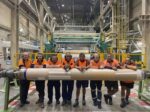Q&A Holger Heinzel, HERA
Digitisation and new technologies are having a profound impact on every facet of the manufacturing industry. As has been discussed in this forum, Industry 4.0 is upon us – enabling and also pushing businesses to collect and analyse data to streamline and improve the efficency of their systems and processes. The new tech gives so much – freed-up time and productivity boosts, less waste, far better and faster insights for a business to improve. We appreciate, though, that innovation requires investment and this is a time when many organisations are maintaining a hawk-like eye on capex and opex. The good news is that it’s worth it: HERA’s 2021 report in collaboration with BERL modelled the potential economic impact of Industry 4.0 on the New Zealand construction industry and found that gains over the next five years could be as much as $8 billion, and a heartening $4 billion at the moderate optimistic forecasting. And that is only for that part of the NZ economy. The potential for individual businesses and the wider industry is clear if we can take advantage of it. To that end, we are focusing on tools and methodologies to help members and other manufacturing organisations with the transition to Industry 4.0. A good starting point for company is to establish where they currently sit at, as a starting point for their transformation journey or how far they might have already come. What is the SIRI Assessment? Siri, short for Smart Industry Readiness Index, is an Industry 4.0-focused global assessment scheme. It was developed out of Singapore and is available to manufacturers in New Zealand. In the past four years, over 300 companies worldwide have used the SIRI Assessment to formally evaluate their facilities and processes and kick-start their Industry 4.0 transformation. The tool works for a wide […]










